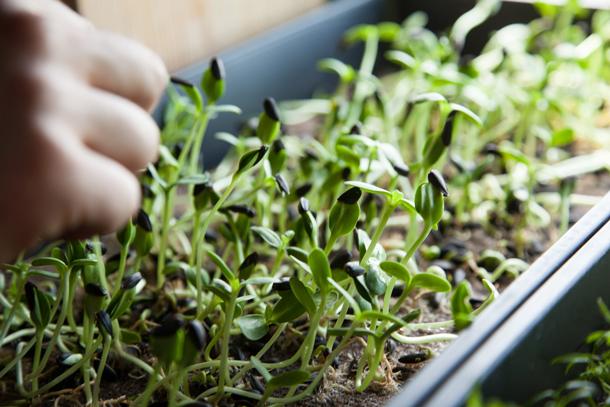With so many people isolated at home and the economy so wobbly, for those with the space this is a fine time to start growing some of your own food — and, in fact, seed companies are reporting record sales this spring.
Landscape designer Michael Weishan, the former host of the PBS series “The Victory Garden,” says “if you’re a gardener, you’re never that isolated.”
“I have a greenhouse full of ‘friends’ here — and ducks and chickens and geese,” Weishan says. “I have a small property outside of Boston. And they require tending. In the garden, nature goes on; it gets your mind off a lot of other things.”
What you can start to grow depends, obviously, on where you live and how much space you have. But wherever you might be, Weishan says, there’s plenty to do.
In the Northeast, all the cold-weather vegetable garden crops can go in, and soon it will be time to plant all types of seeded annuals and flowers for the summer garden, Weishan says. He suggests starting some of these vegetables, such as tomatoes, peppers, leeks and peas, indoors, so they’re ready to go when the weather permits.
In the South, which, seasonally, is about a month ahead of the Northeast, gardeners can begin planting warm-weather crops because the frost dates have passed. This also includes non-hardy annuals and non-hardy perennials. All the things that in the North would get planted in May can be planted now in the Southern states, Weishan says.
On the West Coast, where spring has fully begun, just about everything is ready to go. Nurseries are open and fully stocked with plants of any type and description, Weishan says.
For those trapped inside without space for a garden, Weishan suggests choosing a few items from “a new explosion of houseplants.”
“There is just an amazing number of plants available,” he says. “There are some really great specialty nurseries where you can order plants for almost any type of light situation. There are some houseplants you only have to water once or twice a month, so for people who travel or people just don’t like watering, that’s a really great option.”
For people with limited space or an urban apartment, microgreens are another good option. Microgreens are small vegetables, 1 to 3 inches tall, that can be grown indoors in small flats or plastic tubs. They don’t require much space or even a lot of sun, Weishan says. He has already started to grow, on flats on his back deck, most of the herbs he would grow in his summer garden, like cilantro, arugula and small lettuce greens.
Certain garden fruits are easy to grow, as well, Weishan says. The easiest one is the raspberry, which, technically isn’t a fruit but grows like crazy in most settings, he adds.
“They’re all brambles by nature,” Weishan explains. “The native varieties of them are essentially weeds. I grow a variety here called ‘canby’ that is a particularly fantastic late-season raspberry that has no spikes, so you don’t get stabbed when you’re trying to harvest them and they’re literally the size of your thumb. They’re fantastically delicious raspberries. Thornless varieties are just really fantastic.”
Weishan also grows blueberries, gooseberries and currants — all things that essentially grow themselves and require little work, aside from cutting them back when they start to take over the garden.
Weishan is also a huge proponent of including chickens as part of one’s outdoor garden, for those with the space to try it out. You don’t need a rooster, he says, just a couple of hens.
“The nice thing that most people don’t realize is that chickens are by nature omnivores — they eat anything,” he says. “Mostly, people feed them grain which you can buy food at the store… but you can totally raise chickens on all the scraps from your table.” “Instead of wasting any food at all, they love everything — spoiled yogurt, old pasta, any greens you have. … All the bits of rice, little bits of meat, anything that you have can go out to the chickens and they just love it and produce these spectacular eggs. So it’s a complete circle. … And the eggs, of course, are phenomenal. They don’t taste anything like the eggs from the store.”
Gardening not only provides fresh, organic food, but can be therapeutic, Weishan adds. “It’s sustaining, and so you get something out of it, in terms of productivity, and you actually get something from it in terms of mental improvement,” he says. “It’s been proven to be mentally helpful. It’s on par with meditation.”
“So, you have cardiovascular improvement, you have mental health improvement, [and] it lowers blood pressure because it has a calming effect,” Weishan adds. “These things have all been researched and are proven. In general, there is just a huge benefit from gardening. You get the product, it increases the productivity of the property, and it increases your health. So, in many ways, you can see why it’s the most popular hobby in the United States.”
This article is based on an interview by Bobby Bascomb that aired on Living on Earth from PRX.
